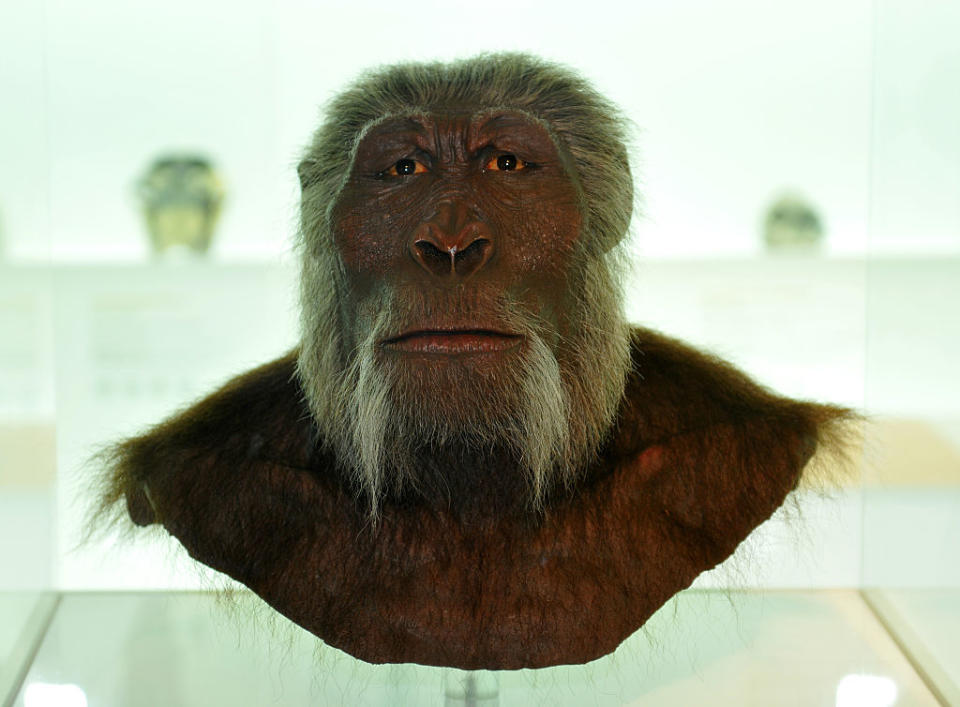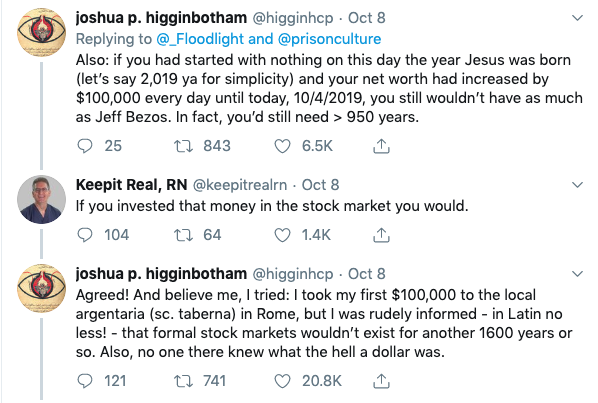Average Australian must work 2.7m years to match Amazon CEO's wealth

Amazon founder Jeff Bezos is worth an eye-watering US$114 billion (AU$169 billion) – an amount that makes him the richest person in the world.
And this fact hasn’t been lost on Twitter, with two tweets querying the tech genius’ wealth going viral.
Related story: 7 unexpected habits of millionaires
Related story: Inheritance tax in Australia ‘bound to happen’
Related story: ‘No one deserves that much money’: Facebook founder says billionaires are ‘unfair’
“If you worked every single day, making $5000/day, from the time Columbus sailed to America, to the time you are reading this tweet, you would still not be a billionaire, and you would still have less money than Jeff Bezos makes in a week,” Jeremiah Red wrote on Twitter on Tuesday.
“No one works for a billion dollars.”
If you worked every single day, making $5000/day, from the time Columbus sailed to America, to the time you are reading this tweet, you would still not be a billionaire, and you would still have less money than Jeff Bezos makes in a week. No one works for a billion dollars.
— Jeremiah Red🌹 (@_Floodlight) October 7, 2019
In fact, according to a follow-up experiment by Twitter user, Corey DenOfHorrors, it would take around 12,009 years to earn that much, assuming you were earning a whopping $25,000 a day.
That means you would have needed to be earning that money since the Stone Age, or around 10,000 BC.
Here's a quick vid showing the math pic.twitter.com/ZUYxlQ5sU7
— Corey DenOfHorrors (@CoreyDehMan) October 8, 2019
And if you were earning $5,000 a day, it would still take 44,000 years to reach US$80 billion, or around four-fifths of Bezos’ titanic fortune.
“There are a few caption retweets of this thread saying that this is depressing. And you know what? It is. This is unacceptable. How to change this, I'm not sure. But the first step towards change is knowledge. Be aware of what's going on, and figure out where to go,” Corey wrote.
Break it down for us Australians?
In Australia, the average weekly earnings is $1,225, or $254 a day over a five-day week.
That means that an Australian earning this amount would need 2.7 million years to make Bezos’ money. This was around the time that humans were evolving from Paranthropus’, which looked like this:

Twitter responds
The two posts set off a tweet-storm, as users pointed out that Bezos accrued his huge wealth through the success of Amazon, rather than as a salary.
But others argued that regardless of whether his earnings were the result of a salary or business success, that amount of money was obscene.
“That's just insane. He could literally write checks and wipe out SO many problems in an instant and end the suffering of millions of people and still be a multi-billionaire. I can't comprehend how someone can hoard money like that,” The Bern Identity wrote.
“Also: if you had started with nothing on this day the year Jesus was born (let’s say 2,019 ya for simplicity) and your net worth had increased by $100,000 every day until today, 10/4/2019, you still wouldn’t have as much as Jeff Bezos. In fact, you’d still need > 950 years,” added another.

But, one user retorted, if that particular amount of money had been invested in the stock market, they would have hit that sum.
Others said this experiment just highlighted the way capitalism can work.
“The myth that capitalists work for their money is so freakin backwards too. By definition they have *other people* work for their money, while they sit back and collect all that surplus value without doing a lick for it,” user Marx was Right said.
But others still said the thought experiment was flawed to begin with as Bezos’ net worth was tied up in shares.
“This is bovine scatology. Bezos net worth is $125b. It’s not like he is hoarding billions in his bank. His net worth comes from minority stock ownership in amazon (16%). Don’t like that? Stop using amazon. His actual gross cash income is $23,098/wk. Less than most NFL players,” user Eric Briggs said.
Should we tax the rich?

The Twitter storm comes as questions around the roles of billionaires in society take up increasing amounts of space in political and economic conversations.
Some, like US Senator Bernie Sanders have queried whether billionaires should even exist.
Putting forward his plans for a National Wealth Registry and tax, Sanders told The New York Times: “This proposal does not eliminate billionaires, but it eliminates a lot of the wealth that billionaires have and I think that’s exactly what we should be doing.”
Speaking in an employee Q and A, Facebook founder Mark Zuckerberg (who has a net worth of US$67 billion) said that while his huge wealth was “unfair”, it was also “optimal” when the alternative was a government which made all of the funding decisions.
“You can think at the same time that it’s unfair that an individual has that wealth but still think that it’s better for everyone that there is some competition of the ideas that can get pushed out there.”
Fellow billionaire, Bill Gates, said he isn’t against a tax on the ultra-wealthy, but believes increasing capital gains tax is a better way to tax huge fortunes.
Dutch historian Rutger Bregman kicked off the wealth tax debate early this year while speaking at the World Economic Forum in Davos.
“This is my first time at Davos and I find it quite a bewildering experience to be honest,” he said.
“I hear people talking the language of participation and justice and equality and transparency.
“But then almost no-one raises the real issue of tax avoidance, right, and of the rich just not paying their fair share.
“It feels like I’m at a firefighters’ conference and no-one’s allowed to speak about water.”
He was speaking on a panel about an Oxfam report which found that 26 billionaires have the same wealth as the world’s poorest 3.8 billion people.
“Ten years ago the WEF asked the question, ‘What must industry do to prevent a broad social backlash?’ The answer is very simple: just stop talking about philanthropy and start talking about taxes. Taxes, taxes.”
Make your money work with Yahoo Finance’s daily newsletter. Sign up here and stay on top of the latest money, news and tech news.

 Yahoo Finance
Yahoo Finance 
